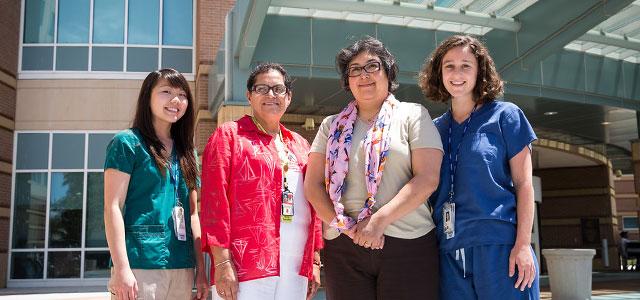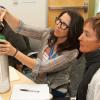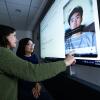
At the VA Palo Alto Health Care System, from left: Julie Tea, MEPN student; Gloria Martinez, associate director for Patient Care and Nursing Services; Denise Renfro; and Sophia Nogue, MEPN student (photo by Elisabeth Fall)
Partnership with Palo Alto VA Gives MEPN Students Critical Experience
In the summer of 2014, prior to taking his NCLEX (National Council Licensure Examination), UC San Francisco Master’s Entry Program in Nursing (MEPN) student Sam Lee did a seven-week paid residency in the medical-surgical intensive care unit of the VA Palo Alto Health Care System (VAPAHCS).
Lee is a veteran – he served nine years in the Air Force, including a year in Iraq; he continues to serve as a reservist and was promoted to major in July – and was thrilled to be able to take care of his fellow vets, but his service time was not what made the residency possible. Rather, the prelicensure program emerged from a partnership forged in 2014 between UCSF School of Nursing and the VAPAHCS.
 Mary Foley (left) and Deborah Johnson The program matches MEPN students with units that meet their advanced practice goals, thereby providing them with an invaluable – and paid – experience working with complex patient populations prior to taking their RN licensing exam. It was the brainchild of Deborah Johnson, an assistant clinical professor at the School, along with Sandra Chin Sang, chief of Mental Health Nursing at the VAPAHCS, and Gloria Martinez, associate director for Patient Care and Nursing Services for the VAPAHCS, who shared a vision for developing strong advanced practice registered nursing leadership. MEPN Assistant Director Mary Foley has continued the partnership for the summer of 2015.
Mary Foley (left) and Deborah Johnson The program matches MEPN students with units that meet their advanced practice goals, thereby providing them with an invaluable – and paid – experience working with complex patient populations prior to taking their RN licensing exam. It was the brainchild of Deborah Johnson, an assistant clinical professor at the School, along with Sandra Chin Sang, chief of Mental Health Nursing at the VAPAHCS, and Gloria Martinez, associate director for Patient Care and Nursing Services for the VAPAHCS, who shared a vision for developing strong advanced practice registered nursing leadership. MEPN Assistant Director Mary Foley has continued the partnership for the summer of 2015.
“The Palo Alto VA is one of the top agencies in the VA system, a great training site that can provide an opportunity for students to showcase their strengths and open up possibilities of jobs caring for veterans,” says Johnson, who teaches in the Psychiatric/Mental Health Nurse Practitioner program. “Already, we have seen a difference in the students who accepted the challenge last summer.”
Student Reaction
Lee came to nursing from a similar instinct that motivated his military service: he wanted to “contribute to the moral welfare of society, to help people in a tangible way,” he says. And because he eventually would like to work with underserved populations or vets, he found the residency particularly gratifying.
“My military experience helped me build relationships [at the VA], to have those therapeutic conversations,” he says. “I understand what they’ve gone through, and there was a kind of instant camaraderie.”
 Sam Lee Lee’s residency also exposed him to a number of acutely ill patients and challenging situations. “A lot of times, you’re dealing with patients right out of heart surgery, and this one preceptor, Sofia Morgan, knew everything and helped me feel I was able to handle a lot more than I realized,” he says. “At first, she shielded me from a lot of anxiety-inducing things and then slowly delegated specific duties to me, so I could handle the monitor, patient and drug [administration] in a timely way.”
Sam Lee Lee’s residency also exposed him to a number of acutely ill patients and challenging situations. “A lot of times, you’re dealing with patients right out of heart surgery, and this one preceptor, Sofia Morgan, knew everything and helped me feel I was able to handle a lot more than I realized,” he says. “At first, she shielded me from a lot of anxiety-inducing things and then slowly delegated specific duties to me, so I could handle the monitor, patient and drug [administration] in a timely way.”
Audrey Combs is another MEPN student who completed the residency in 2014; her goal is to become a family nurse practitioner. “It was excellent training in RN practice,” she says of the residency. “I had a one-on-one nurse preceptor each day and, by the end, had a lot of autonomy. Of course, anything that came up that was questionable, I’d check with my preceptor, but by day two or three I was doing things like wound care [with minimal supervision] – and what was nice was I felt prepared, and it’s great that the school provided us this opportunity in a Bay Area job market that is so competitive.”
Lee says that his residency not only helped prepare him for the NCLEX, but also made him a better nurse. “I got to see so many new things. I saw 70 percent of the stuff we talked about in first year, and it was great that the VA allowed us to test-drive the experience and get more comfortable with bedside nursing,” he says. “As you get more experience, you have more confidence and patients can smell your confidence from a mile away.”
Mutual Respect, Mutual Benefit
“I really respect the work they do at both the San Francisco and Palo Alto VAs,” says Foley. “It’s a real positive environment for our students – a tremendous emphasis on safety and quality – and we hope to be able to expand these types of programs and rotations in the future.”
“We embrace how important it is for students to learn how to care for a veteran population,” says the School’s dean, David Vlahov. “Not all veterans get all of their care in a VA medical center, so having this experience provides important preparation that can cross settings. And we were one of the first schools to sign up for Michelle Obama’s Joining Forces campaign to prepare nurses for care of our veterans. This partnership moves us forward in meeting this goal.”
“By introducing students to the Palo Alto VA and veteran population, we’re hoping some will fall in love with caring for our veterans, but we’re also hoping the student nurses gain job experience with complex patients, so they’re a good candidate for any job,” says Carol Valdon, a nurse recruiter at the VAPAHCS.
“I’ve spoken with other nurse executives in the Bay Area, and we all have a strong commitment to keeping the cream of the crop here,” says Martinez. “Being our partner says a lot about UCSF and gives us an opportunity to work with the leadership there, [which means] students get experience in a real-life unit, contribute to the elevation of practice at the bedside and understand what it is to be a member of a 21st-century health care team.… It’s these types of programs that will benefit patients and health care in the long run.”



